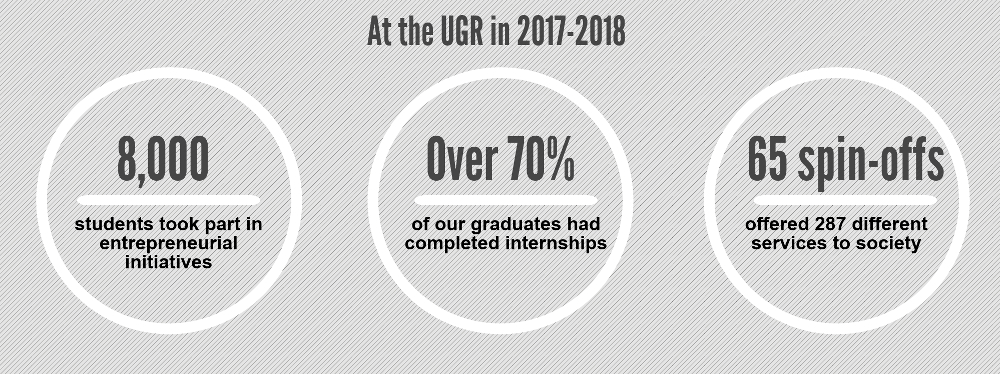
At the University of Granada we are committed to enhancing your career prospects. Every year we enable thousands of students to plan for their futures by connecting them with industry professionals, recruiters, and further study providers. We offer career support, personalised guidance, professional development workshops and a range of online resources, ensuring that you acquire the skills and know-how to achieve your career goals. The University is also the largest employer in Granada and we maintain strong ties with a host of local, national and international businesses and organisations.

As a UGR student you will have the opportunity to:
-
Seek career advice from our experienced staff members
-
Complete internships at local and international organisations
-
Study abroad on international mobility programmes
-
Learn Spanish and other languages
-
Volunteer locally or abroad
-
Attend careers fairs
-
Take short courses
-
Join societies and clubs
-
Attend workshops on public speaking, interview techniques and pitching ideas
-
Develop entrepreneurial initiatives
-
Acquire leadership skills by becoming a student representative
Personalised career support
Our team of knowledgeable career advisors at the Employment and Work Placement Office (CEP) is committed to supporting students, graduates, researchers and staff in realising their potential in today’s globalised labour market. The Centre provides the following services:
-
Career advice in one-to-one sessions
-
Internships at companies, organisations, and public bodies (including the UGR)
-
International internships (via Erasmus+ traineeships and the UGR Transnational Internship Fund)
-
A job offer database
-
Professional development workshops and resources
-
Careers fairs and open days
-
The UGR Employment Forum
-
Mock interview sessions (available online)
Via the UGR Empleo website you can subscribe to receive emails notifying you of job offers, mobility opportunities, and internships, tailored to meet your specific needs and areas of interest.
Placements and internships
A work placement or internship can help you to explore career options before graduating, gain industry-specific skills, and expand your professional networks. In general, there are three types of internships at the University of Granada:
-
Prácticas extracurriculares: These are optional internships that are managed by the Employment and Work Placement Office (CEP). They do not form part of a specific course curriculum and no do bear any ECTS credits. However, they can be included in your European Diploma Supplement (DS). You need to be registered in the "ÍCARO" Work Placement and Employment Portal to undertake these internships.
-
Prácticas curriculares: These internships are compulsory on specific degrees and must be completed in order to obtain the corresponding degree diploma (i.e. they are credit bearing). They are managed by each faculty or school. On certain master’s degrees, you may be able to apply to have your prior work experience officially recognised by the University (this is known as ‘reconocimiento de créditos’) and if given approval you will not be required to complete a compulsory internship.
-
International internships: As a UGR student you can complete international internships through initiatives such as the Erasmus+ traineeship programme and the UGR Transnational Internship Fund.
"ÍCARO" Work Placement and Employment Portal
Study a language
By studying a language you can gain key skills in communication and cultural awareness – skills that are highly sought-after by employers in the current global marketplace. Spanish is the world’s second-most spoken native language (after Mandarin Chinese) and the ability to speak it is increasingly viewed by employers as a highly valuable asset.
As a UGR student you can learn Spanish and other languages — including English, French, German, Italian, Japanese, Portuguese, Swedish, Romanian, Arabic and Persian — alongside 8,000 local and international peers who enrol every year on courses offered by the UGR’s Modern Languages Centre (CLM), Confucius Institute, Centre for Slavic Cultures and “al-Babtain” Chair in Arab Studies. Additionally, we provide our undergraduate students with free, official language-accreditation exams at B1 level or higher.
Study abroad
The UGR is the most popular global destination among European exchange students (Erasmus+) and the European leader in figures of both incoming and outgoing Erasmus students. Completing a period of study or research abroad is an excellent way to improve your cross-cultural communication skills, networking abilities, adaptive thinking skills, and resilience — all of which are highly prized by employers.
At the University of Granada we provide our students with exceptional opportunities to gain international experience abroad through programmes such as Erasmus+, the UGR Internationalization Fund and the UGR Development Cooperation Fund. Thanks to these programmes, in the academic year 2017-2018 we offered more than 5,500 international mobility places to our students, in over 100 countries. Moreover, approximately 10% of our undergraduate students, 20% of our master´s students, and 30% of our doctoral candidates are international, meaning that as a member of our university community you will have the chance to develop teamwork skills in a multicultural environment.
European Diploma Supplements (DS)
Upon successful completion of your programme at the UGR, you can request a European Diploma Supplement (DS) to accompany your degree diploma, which will enhance the recognition of your academic qualification abroad and your employment prospects. The Diploma Supplement is issued by universities in line with standards set by the European Commission, the Council of Europe and UNESCO, and is also a Europass tool.
Competitions and awards
Participating in competitions is a fantastic way to develop your skills, acquire experience and knowledge, and demonstrate your talents to potential employers. If you succeed in winning a prestigious prize or accolade, you can include these achievements in your CV and LinkedIn. Furthermore, competitions and awards frequently feature in local and national press, giving participants, winners and runners-up considerable publicity. The University of Granada runs an extensive and varied array of competitions, including:
-
Awards for Excellence in International Mobility
-
University Entrepreneurship Competition
-
UGR Student Awards for Artistic Production
-
"Talento Emprendedor" UGR Ideas Competition
-
UGR Environmental Initiatives Competition
-
"Federico Mayor Zaragoza" Award for University Development Cooperation
-
UGR Social Council Award for Young Researchers
-
Three Minute Thesis (3MT)
To explore the full range of competitions currently taking place at the UGR visit the following website:
Become an entrepreneur
The overall goal of UGRemprendedora — the General Coordination for Entrepreneurship at the UGR — is to foster entrepreneurship and innovation at our university, with a view to making significant socio-economic contributions to our community and to society. It runs programmes and courses in areas such as design thinking, market analysis, social entrepreneurship, career support, start-up management and the acquisition of entrepreneurial skills. UGRemprendedora also runs competitions and provides funding opportunities for start-ups and individuals with innovative projects, enabling you to turn your ideas into a reality. By becoming part of the entrepreneurship community at the University of Granada you will have excellent opportunities to network, receive support, and set up innovative projects either individually or in teams of like-minded people.
Volunteer
Giving your time to a cause that you believe in is not only personally rewarding; it also enables you to gain new skills, build up your work experience, and make valuable contributions to society. Volunteering experience on your CV is also likely to impress employers because it highlights your commitment to personal and professional development, as well as your desire to make a difference in society.
UGR-Solidaria strives to boost local development by providing members of the university community with volunteering opportunities, especially with disadvantaged and vulnerable groups in society. It collaborates closely with a broad range of non-profit organisations and NGOs (including Amnesty International, the Red Cross and Oxfam Internmón) that work in areas such as humanitarian aid, disability awareness and support, environmental awareness, discrimination and racism, addiction, social exclusion, gender inequality, and access to education and culture.
UGR Solidaria: Local volunteering
If you want to volunteer aboad, the UGR’s Centre for Development Cooperation Initiatives (CICODE) provides students with the opportunity to volunteer overseas as part of international development cooperation projects.
CICODE: International volunteering
Join a society
Joining a society is great way to develop your interests, meet like-minded people and acquire skills that are highly valued by employers. From architecture to theatre and music to volunteering – there are plenty of options to choose from. By becoming part of a society committee, or by setting up your own society or club, you can broaden your leadership, teamwork and communication skills.